Hope and the LGBTI Movement in 2021
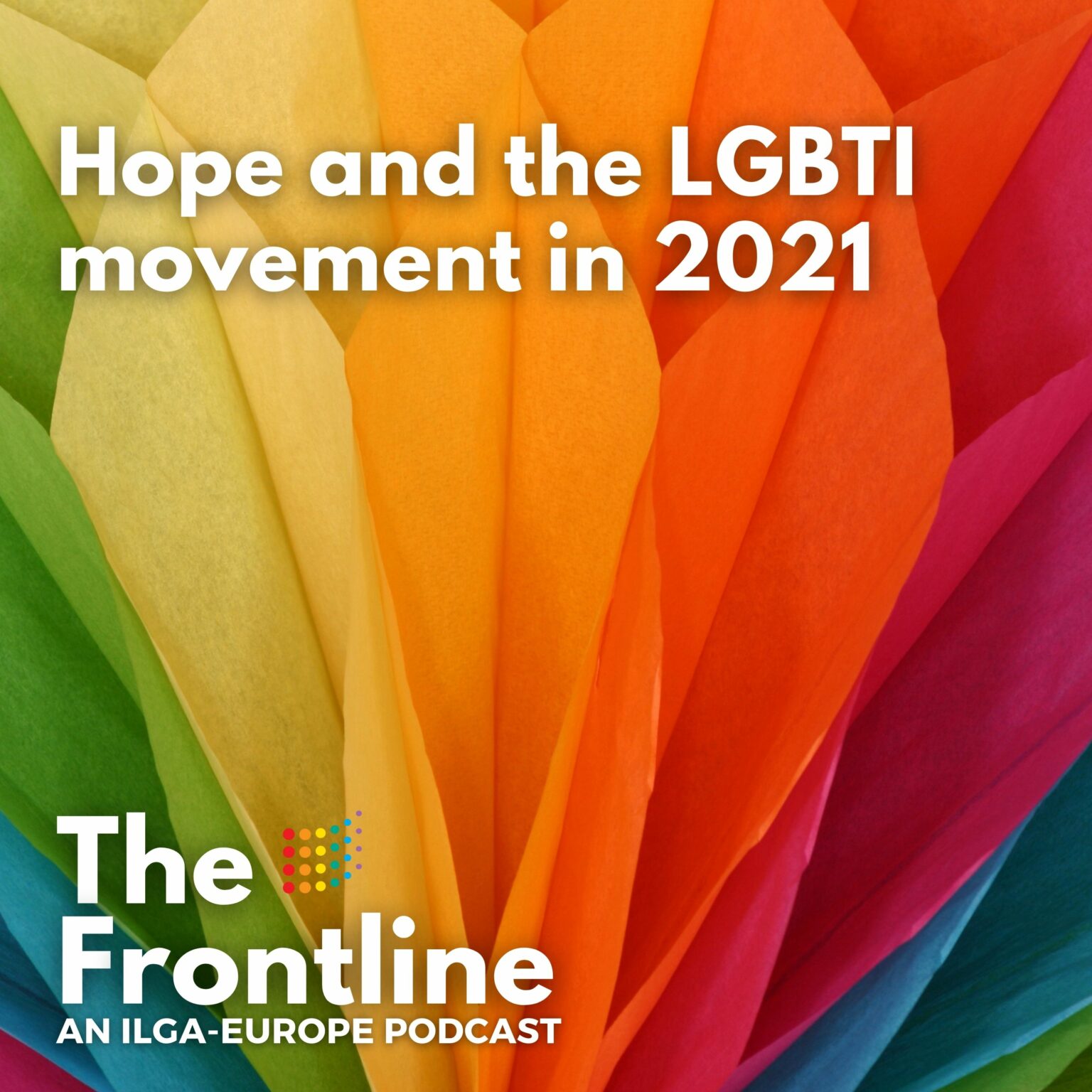
It was a year of further lockdowns, of new strains of the COVID virus, and the uncertainty they have brought, and most of all, enormous reverberations of the unprecedented events of 2020 on people’s lives.
At ILGA-Europe, when the pandemic first kicked in, our motto was ‘the work goes on’, and that work most certainly continued apace throughout 2021, with the growth of a perceived east-west divide in Europe over LGBTI rights; infringement procedures taken by the European Commission against Hungary and Poland because of their anti-LGBTI laws and programs; a sharp rise in the demonisation and isolation of trans people from the women’s movement; and an overall rise in authoritarian regimes seeking to instrumentalise LGBTI lives to limit the rights of others.
So, it’s perhaps strange that our guest in this episode, ILGA-Europe’s Executive Director, Evelyne Paradis finds great hope for the LGBTI movement amid the storm. Listen now, and find out why.
The frontline: Navigating Change as an LGBTI Activist
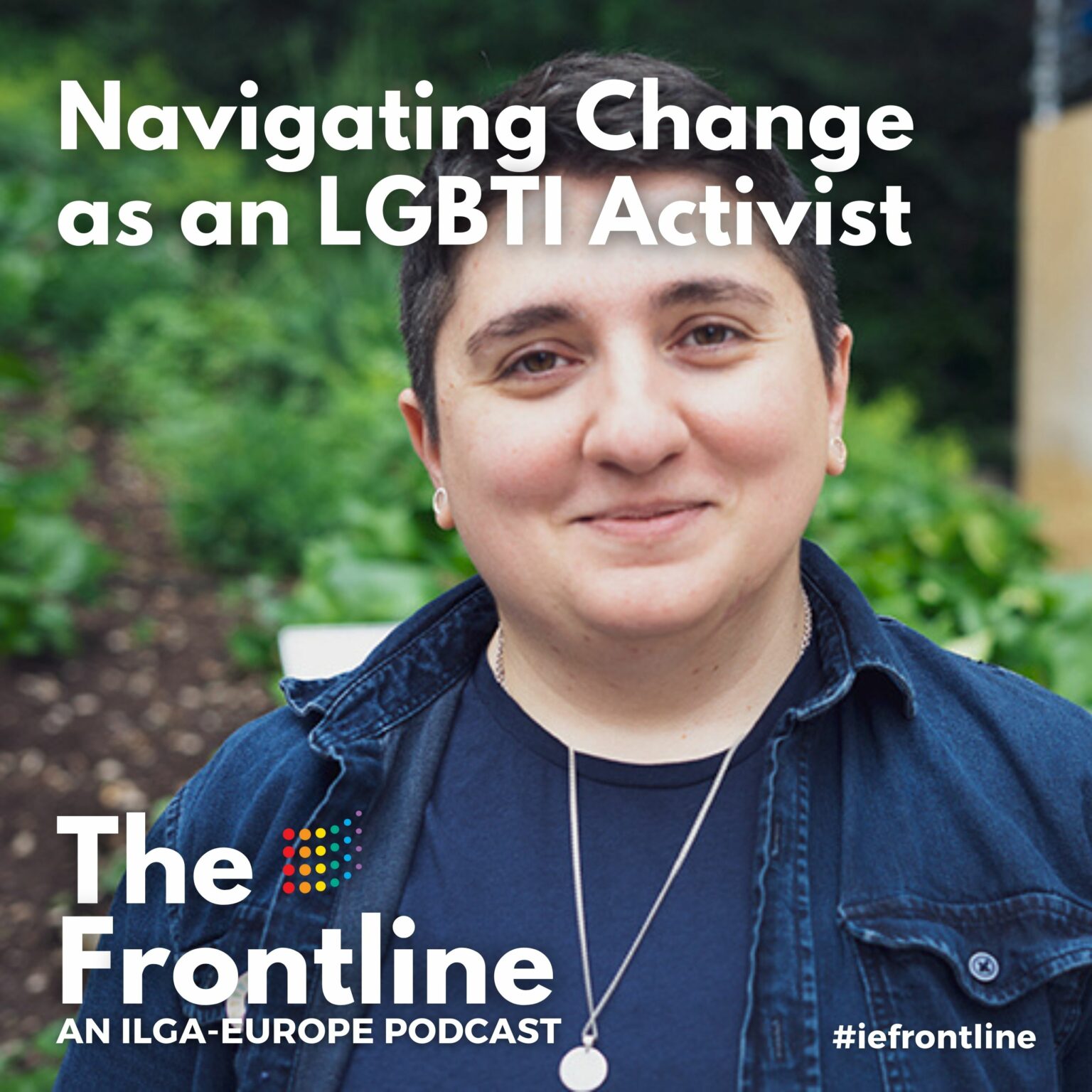
This episode of our podcast features an enlightening conversation about navigating change as an activist, between ILGA-Europe’s Executive Director Evelyne Paradis and Natia Gvianishvili*, who has been actively engaged with local, regional and international LGBTI and feminist movements for over a decade now. Natia began her activist life in Georgia, and she currently resides in Sweden, where she works with the Swedish
Federation for LGBTQ Rights (RSFL).
Evelyne and Natia chat about how change affects activists and activism, and deliberately exploring our relationship with change so that we can find our own compass when navigating a constantly transforming world.
Listen below or click here to listen and subscribe to The Frontline on your favourite podcast platform.
* Since this episode was recorded, Natia Gvianishvili has been elected to the ILGA-Europe Executive Board
The Frontline: Being an LGBTI Activist Today
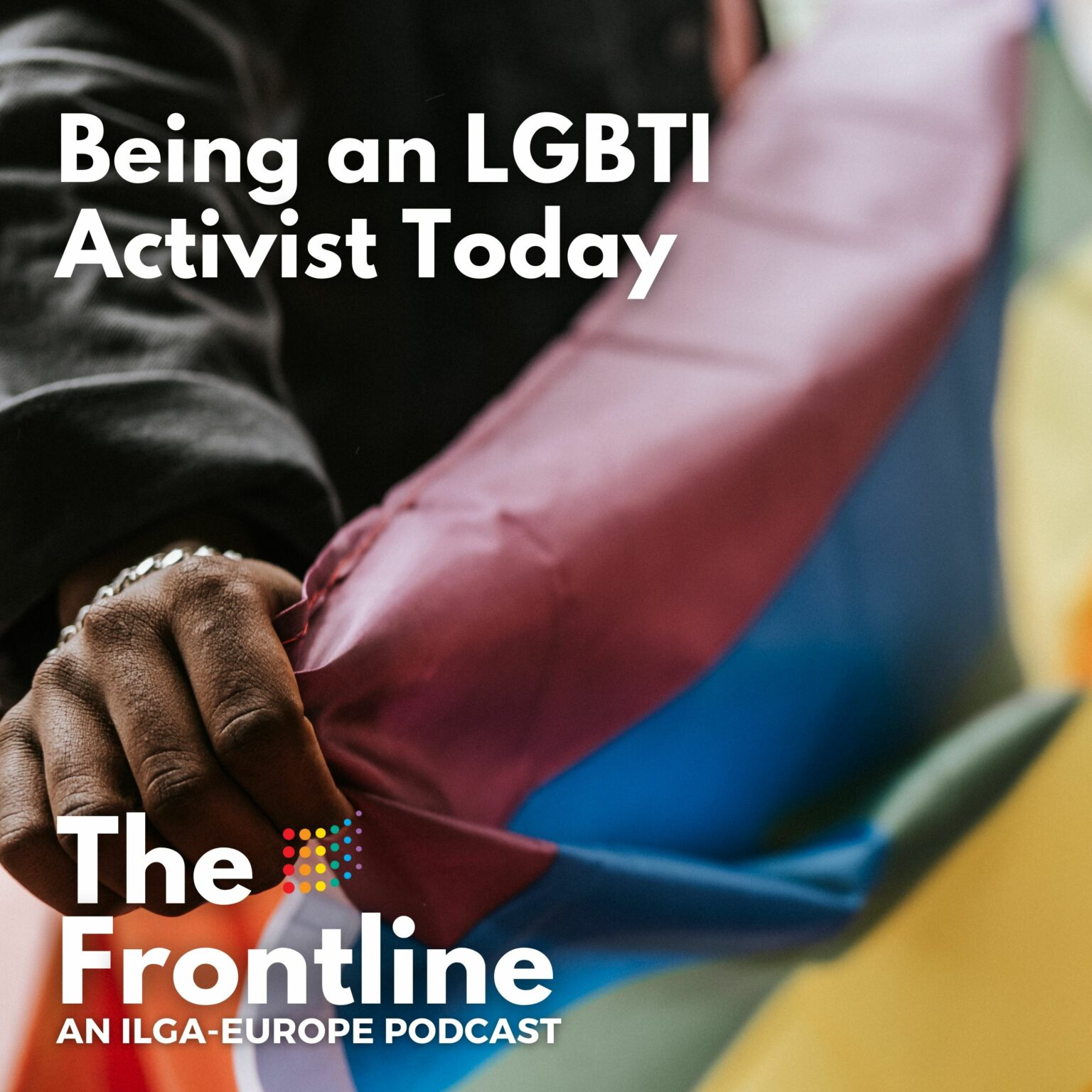
Joining us to talk about the reality of queer activism in the current context, the good sides and bad, are ILGA-Europe’s Programmes Director, Bjorn van Roozendaal; Ola Kaczorek, founding member of Love Does Not Exclude, the first organisation to demand marriage equality in Poland; Irena Cvetkovic, the Executive Director of Coalition Margins in North Macedonia, which works to promote and protect the human rights of marginalised communities, and Ruslana Hnatchenko from the Ukrainian lesbian feminist NGO, Women Association Sphere.
Listen below or click here to listen and subscribe to The Frontline on your favourite podcast platform.
The Frontline: Empowering LGBTI Activists in a Changing World
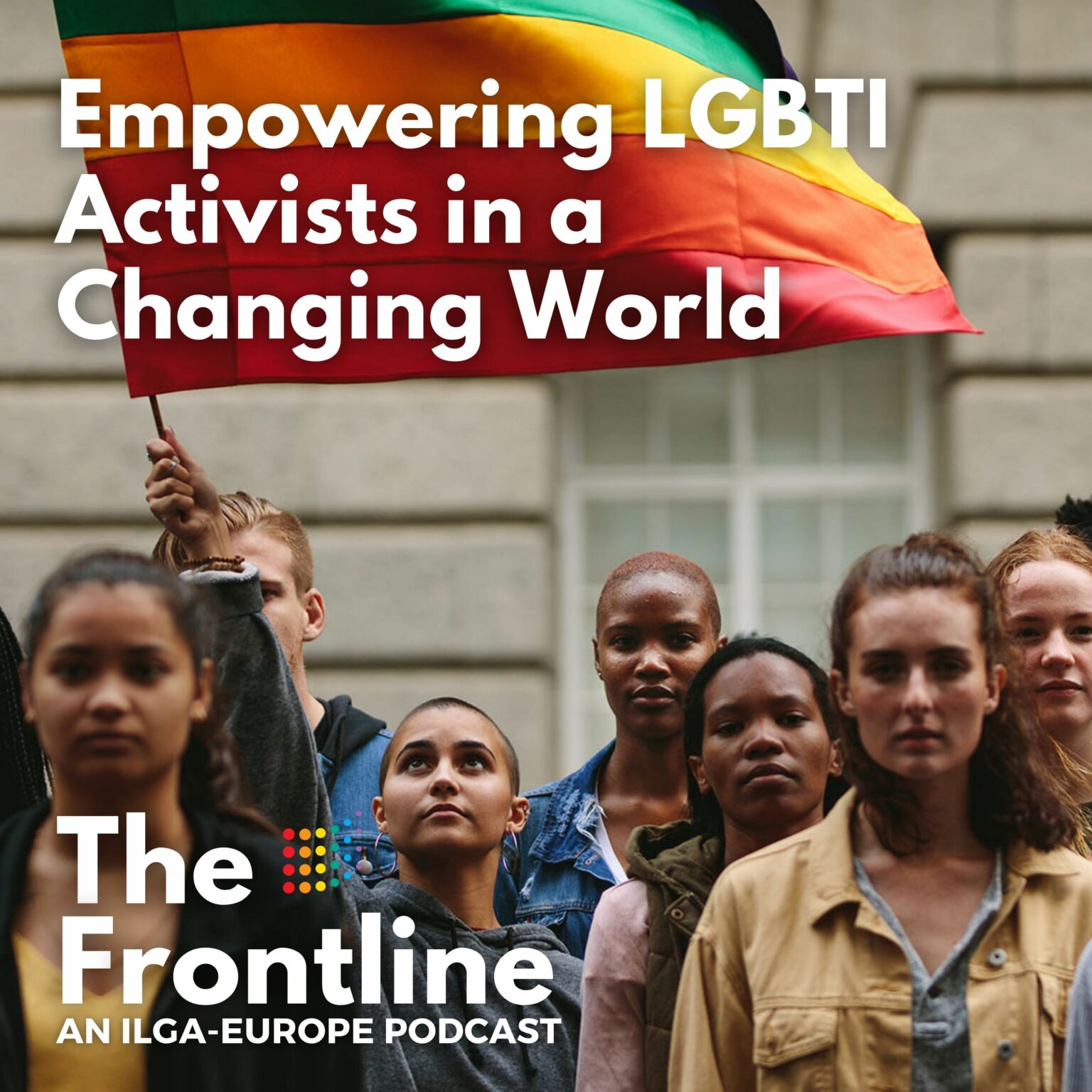
To introduce our new series on empowering LGBTI activism, Bjorn Van Roozendaal from ILGA-Europe talks about the priorities of our work with activists in a world that’s going through enormous change, and what to expect as we explore the challenges are activists face in doing the work, and some of the key ways they are addressing those challenges.
Listen to the introduction to this mini-series below or click here to listen and subscribe to The Frontline on your favourite podcast platform.
The Frontline: The LGBTI Activist Wellbeing Challenge
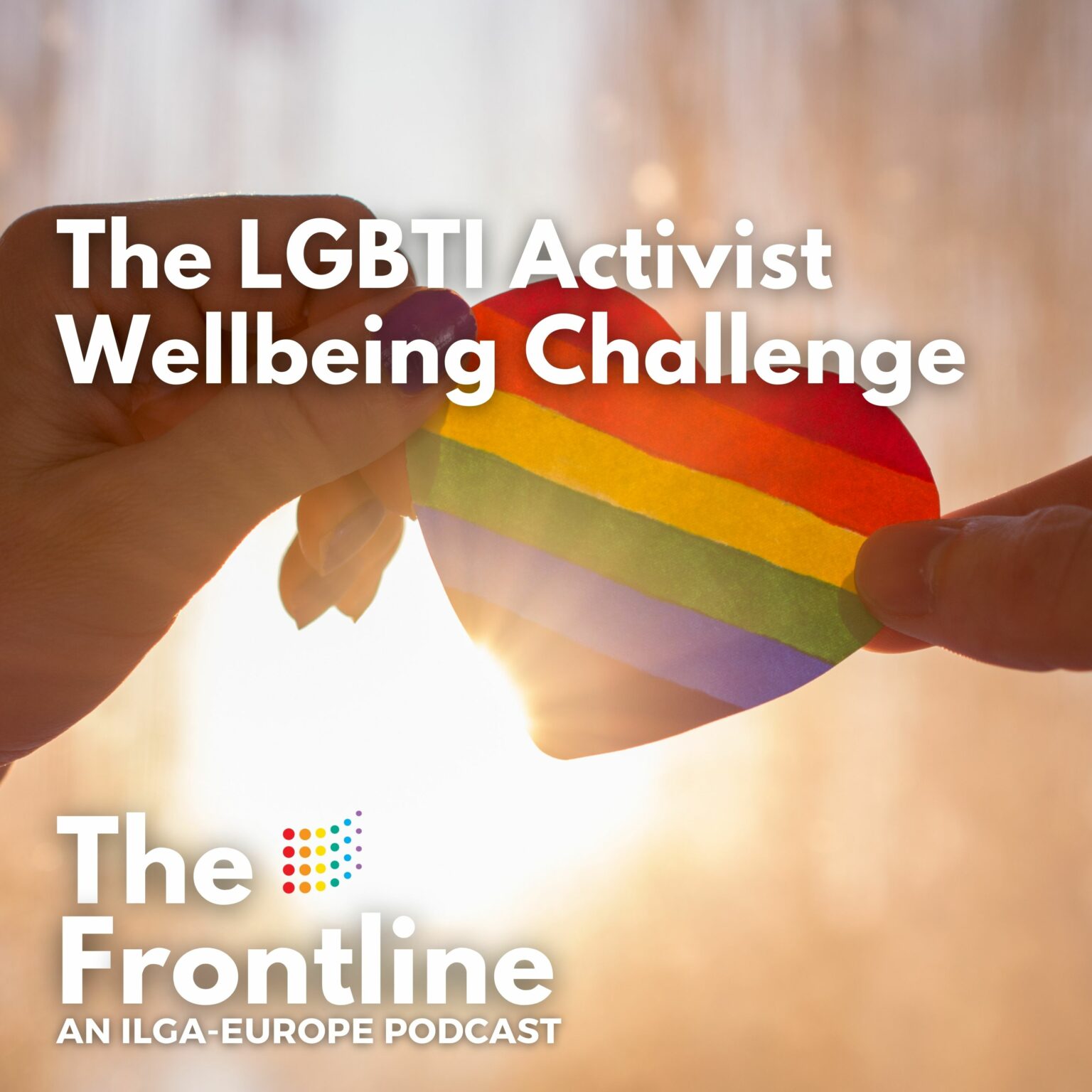
While a number organisations and groups have already taken concrete steps to address wellbeing, there’s no golden rule on how to approach these challenges. In this episode we share what ILGA-Europe has been doing to support the wellbeing of the movement.
Joining us to talk about the distinctive approaches they’ve used to tackle wellbeing issues for their teams are David Kakhaberi, the executive director of Equality Movement in Georgia, and Eka Tseriteli, executive director of Women’s Initiatives Supporting Group, also in Georgia.
Listen below or click here to listen and subscribe to The Frontline on your favourite podcast platform.
The frontline: How LGBTI Activism Can Be Supported
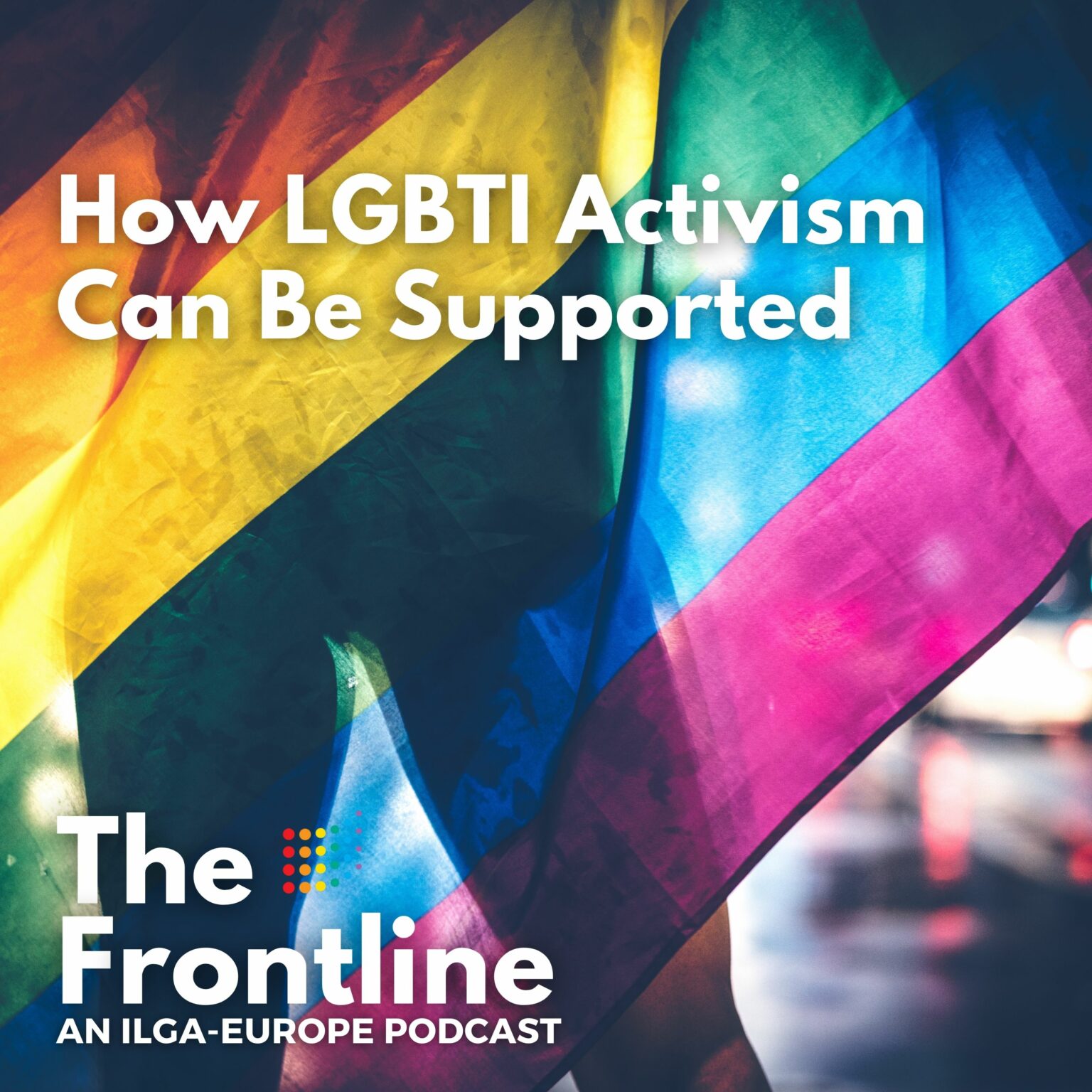
One thing is always clear, no activist or activism organisation can work alone, and the work needs support. But where can that support be found, how can it be accessed, and when it comes through, how can you use it effectively? In this episode, we’re exploring what it means and what it takes to be supported during the highs and lows of everyday activism. We’ll be taking a look at how international and foreign support can be experienced by LGBTI activists in the movement, the difference it can make, and what it takes to get that support and make real use of it.
Joining us to chat about support and empowerment are Stefan Sparavalo from Da se Zna in Serbia and Marty Huber, from Queer Base in Austria.
Listen below or click here to listen and subscribe to The Frontline on your favourite podcast platform.
The frontline: Queer and the Media: with Ben Hunte
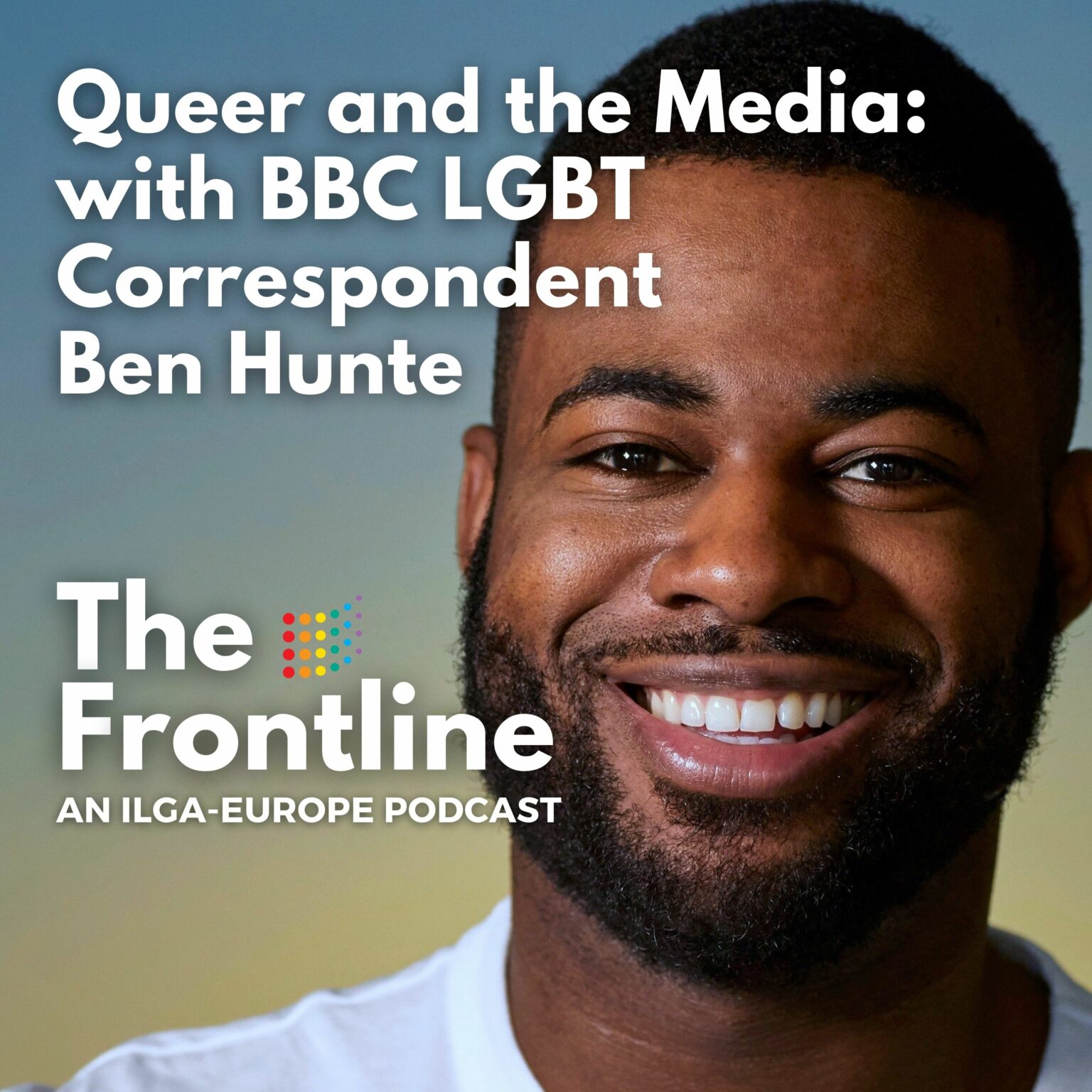
Ben Hunt’s first year on the job as BBC LGBT Correspondent* has been an unprecedented one, with the rise of anti-LGBT hatred in Europe, marked by stark developments in Poland and Hungary.
In this episode of The Frontline, Ben sits down with us to talk about the relationship between the media and LGBTI issues, why some stories get all the attention to the detriment of others, the rise of anti-trans voices in newspapers and broadcasting, and ways we might get the real diversity of LGBTI stories picked up.
Listen below or click here to listen and subscribe to The Frontline on your favourite podcast platform.
* Since the publication of this podcast, Ben Hunte has resigned from the BBC to join Vice News
The Frontline: Elif Shafak and the Power of Our Stories
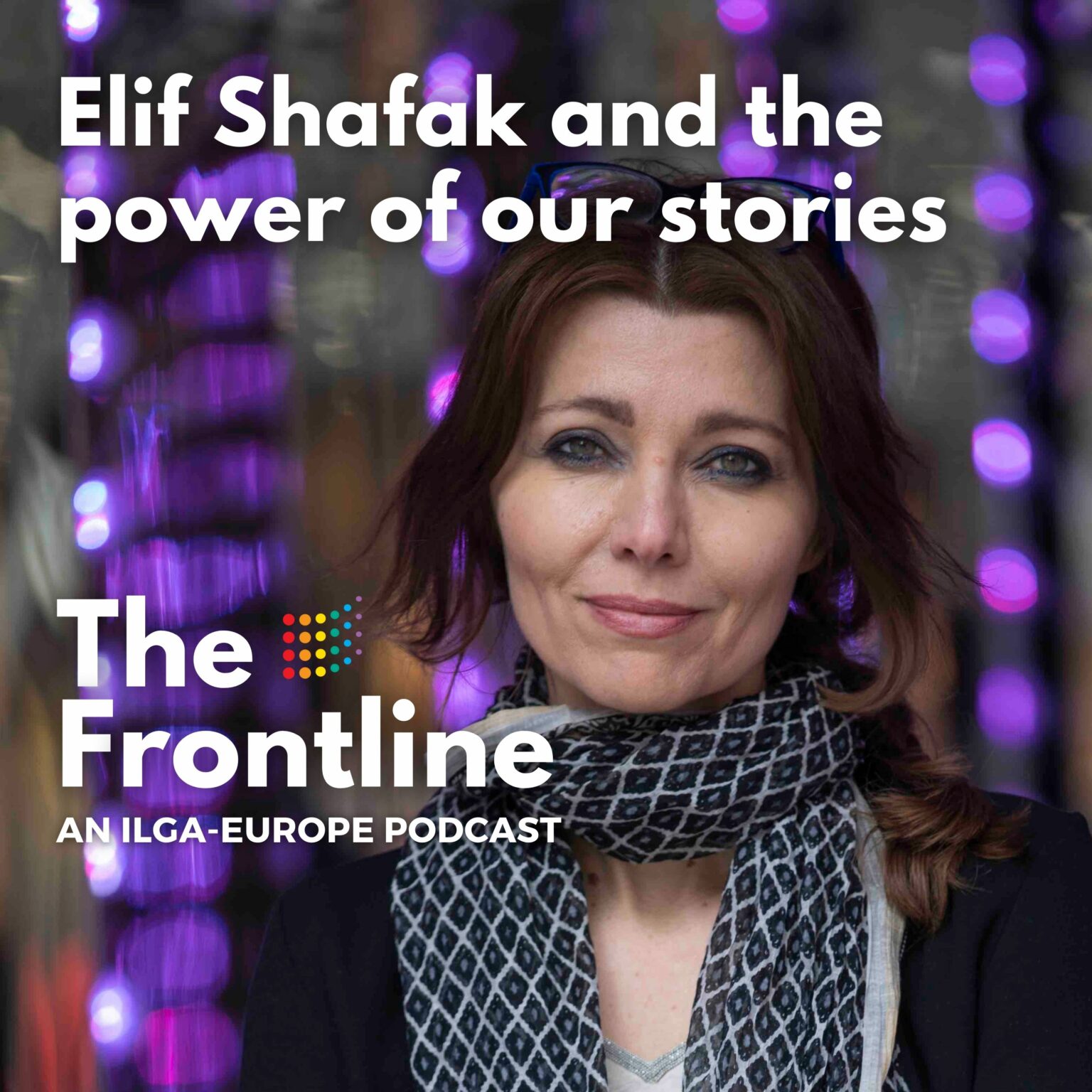
The author of 18 books of fiction and non-fiction, including The Bastard of Istanbul,Honour, and Three Daughters of Eve, Elif has come under fire from the Turkish authorities for writing about human rights abuses that its government denies. Her most recent novel, 10 Minutes 38 Seconds in this Strange World, which tells the story of a sex worker in Istanbul, was shortlisted for the Booker Prize in 2019. It sparked another investigation by Turkish prosecutors for addressing child abuse and sexual violence in her writing.
Elif joins ILGA-Europe’s Executive Director, Evelyne Paradis to talk about a widespread decline of democracy, the fight for LGBTI rights and equality, the power of our stories and her own journey towards being a vocal member of the LGBTI community.
Listen below or click here to listen and subscribe to The Frontline on your favourite podcast platform.
The Frontline: Mapping LGBTI Rights in Europe
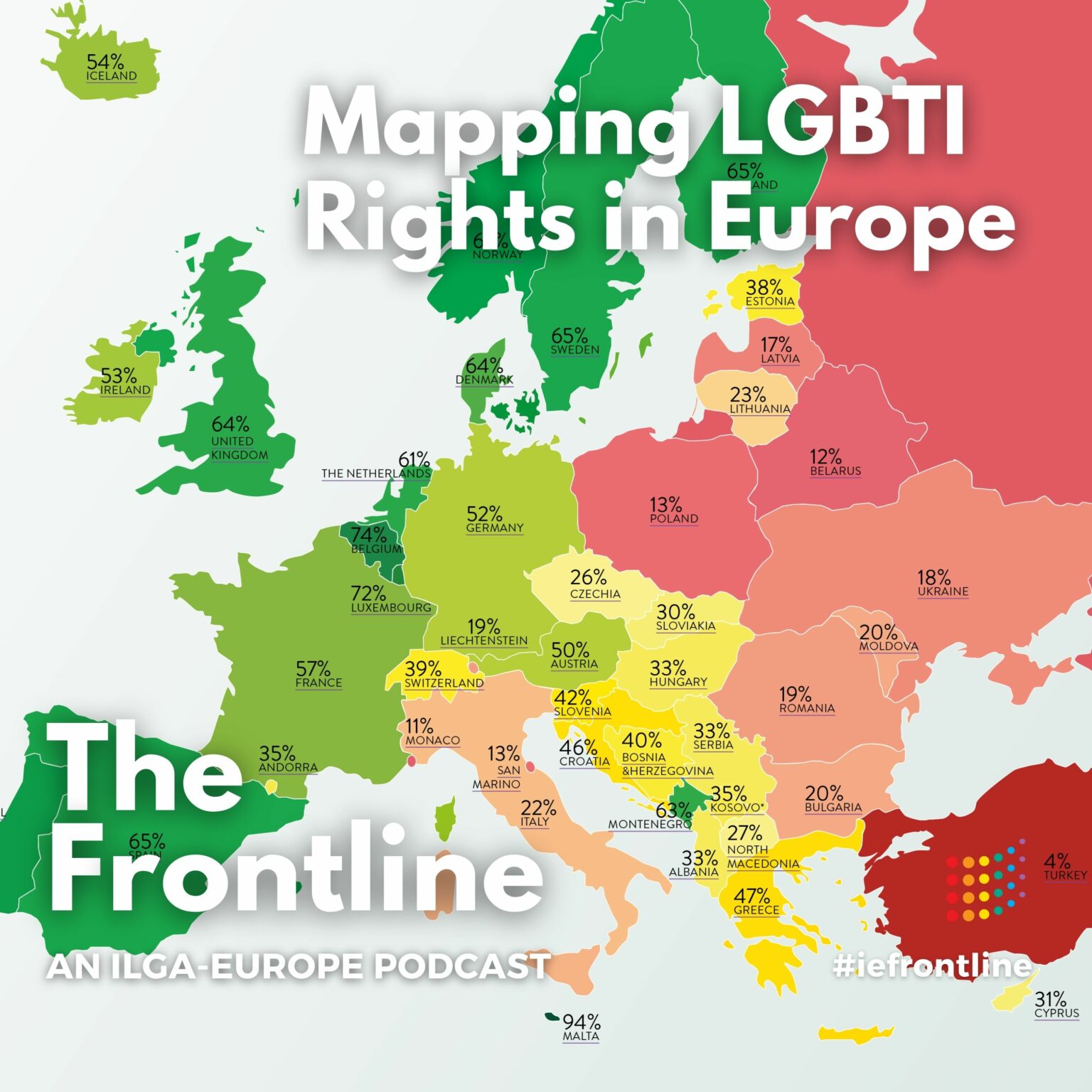
Every year, Rainbow Europe ranks all 49 European countries based on the laws and policies in each to ensure equal rights and protection for LGBTI people. Countries are ranked from zero percent to one hundred, with zero representing gross violations of human rights and discrimination and one-hundred representing full respect for human rights and equality.
The past 12 months have marked an unprecedented year in the map’s 12-year history, with almost no positive legislative change for LGBTI people in Europe. With us to discuss this disturbing stand-still, on both European and national levels, and the ways forward both at European and national levels, are ILGA-Europe’s Executive Director, Evelyne Paradis, our colleague, Bjorn Van Roozendaal, Alexa Moore from Transgender NI in Northern Ireland, Alexa Moore, and Kaspars Zalitis from Mozaika in Latvia.
Listen below or click here to listen and subscribe to The Frontline on your favourite podcast platform.
The frontline: Confronting LGBTI Youth Homelessness
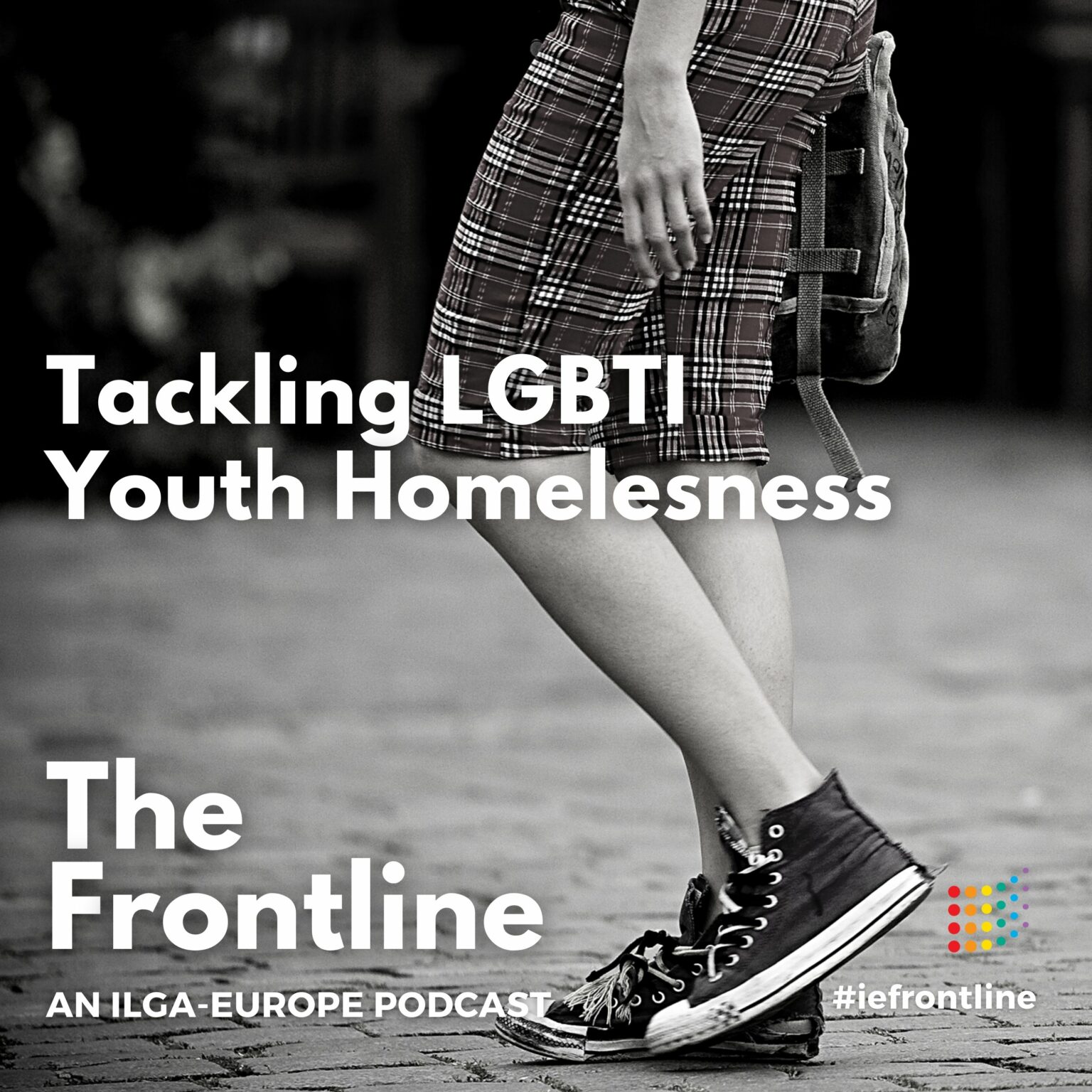
Our 2021 report, in association with Cyndi Lauper’s LGBTIQ Youth Homelessness organisation True Colors United, and the Silberman Centre for Sexuality and Gender (SCSG) at Hunter College in New York, explores the experiences of LGBTIQ focused organisations in Europe working in with young people who have experienced homelessness.
Over 60% of LGBTIQ organisations surveyed for the report said they had worked on the issue. A comparative report from the European Federation of National Organisations Working with the Homeless (FEANTSA), also finds that over 60% of homeless services organisations have dealt with young LGBTIQ people, but often without any training or support.
Our guests for this conversation about the rising issue of young LGBTI people being made homeless in Europe are author of the ILGA-Europe report, Dr Jama Shelton from True Colors United, Policy officer with FEANTSA, Robbie Stakelum, ILGA-Europe’s programmes director, Bjorn Van Roozendaal, and Silvia Magino from Association Quore in Turin, Italy, which has set up a housing project for LGBTIQ people in difficulty.
Listen below or click here to listen and subscribe to The Frontline on your favourite podcast platform.
Rainbow Family Rights in Europe – Part 4: At a Crossroads in Ukraine
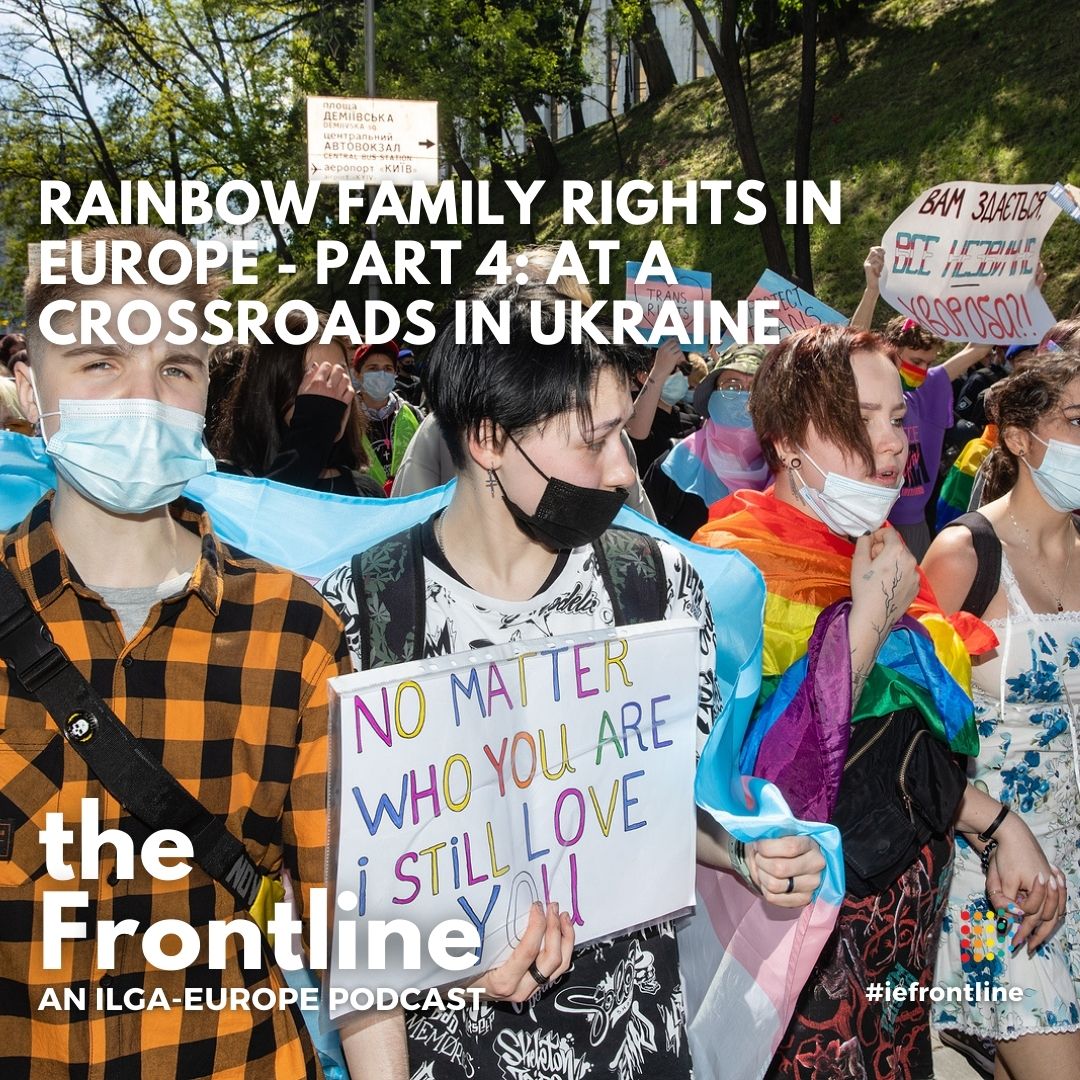
Several pathways for partnership rights were part of the Ukraine took in EU-Ukraine Association agreement 2014-2016.
Based on it the Ukrainian government developed a human rights strategy plan 2013-2019 which included specific commitments to LGBT rights, but many elements of this strategy were not implemented, and civil partnership was dropped from it. However, post-revolution and against the backdrop of Russia’s ongoing military intervention, it is a crossroads time for LGBTI and partnership rights in the country.
In the fourth part of our mini-series on rainbow family rights, during which we we’re looking at the issues affecting LGBTI partners, parents and their children across Europe, we are joined by activists Olena Shevchenko, from the Kyiv-based organisation, Insight and Andriy Maymulakhin, from Nash Mir in the city of Luhansk, about the outlook for partnership rights in Ukraine.
Rainbow Family Rights in Europe – Part 1: The Coman Case Three Years On
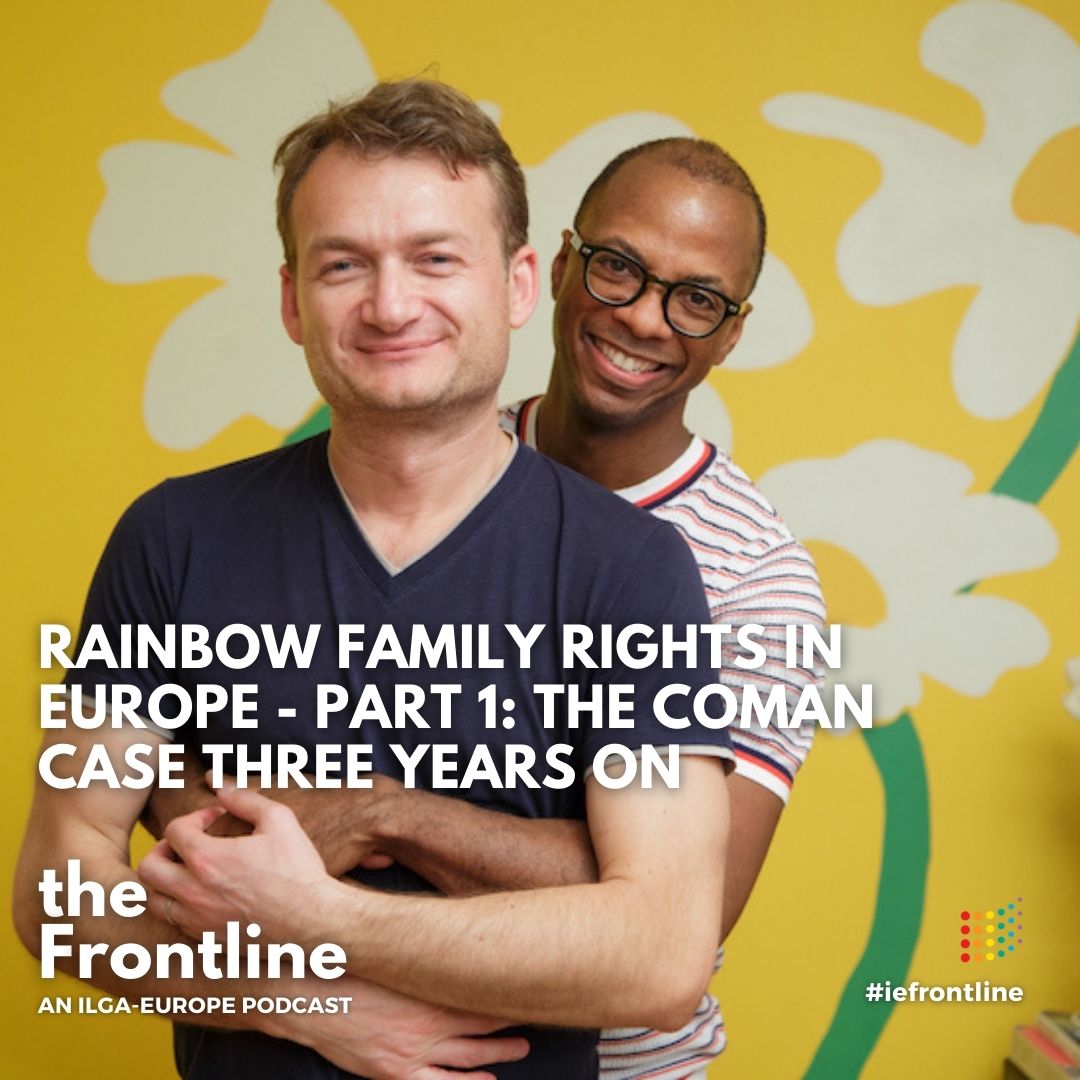
Three years ago, Adrian and his partner Clai were successful bringing their case to the Court of Justice of the European Union, which judged that same-sex spouses are fully recognised as spouses under the EU freedom of movement directive.
As a result, Adrian and Clai, who is American, should have been granted a residence permit in Romania. To this day, the judgement has not been enacted by the Romanian state, and in December 2020, the couple took their case to the European Court of Human Rights to finally get their rights recognised.
We’re also joined by Arpi Avetisyan, head of litigation at ILGA-Europe, to talk about the wider implications of the latest developments in the Coman case.
Listen: Rainbow Family Rights in Europe in 2021 and Beyond
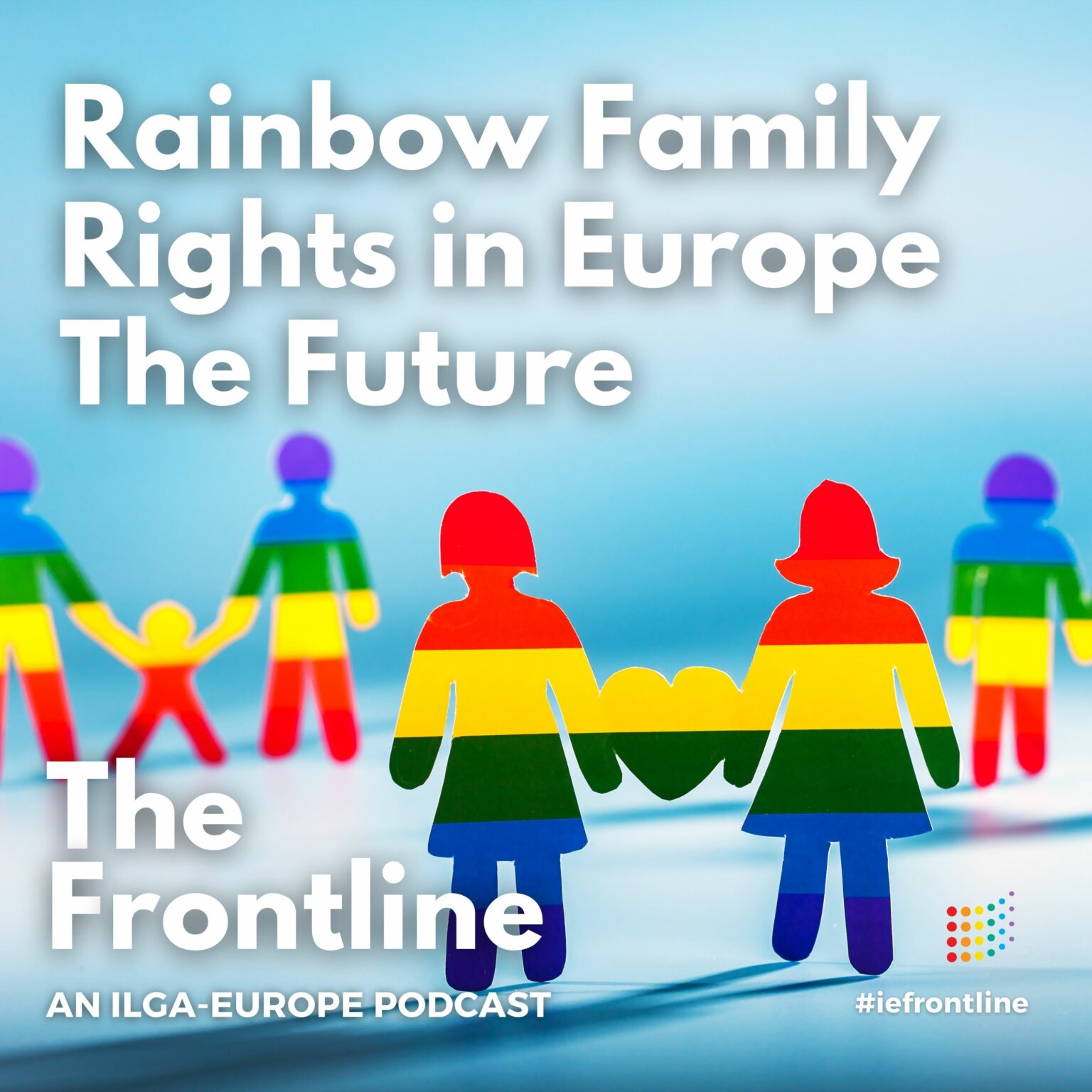
ILGA-Europe’s podcast The Frontline presents a brand-new mini-series looking at the many issues affecting LGBTI parents and their children across Europe.
Presented by ILGA-Europe, The Frontline is a podcast about LGBTI activism and lives in Europe and Central Asia. Deep-diving and analysing from a unique and informed perspective, The Frontline aims to bring you to the core of queer activism and give you an understanding on the complexities of what’s happening, why it’s happening, the wins and the losses, the challenges and commonalities, and the extraordinary ways in which the work of those on the frontlines continues in a rapidly changing world.
The latest mini-series from The Frontline explores rainbow family rights, and the lack thereof, in Europe. We look at two landkark cases being taken to the European courts, explore partnership rights in the Western Balkans and Ukraine, discuss the rights of trans parents, and evaluate the issues that are coming up beyond 2021.
Here are all the episodes:
Part 1: The Coman Case Three Years On
We meet Adrian Coman from Romania. Three years ago, Adrian and his partner Cole were successful bringing their case to the Court of Justice of the European Union, which judged that same-sex spouses are fully recognised as spouses under the EU freedom of movement directive. As a result, Adrian and Cole, who is American, should have been granted a residence permit in Romania. To this day, the judgement has not been enacted by the Romanian state, and in March 2021, the couple took their case to the European Court of Human Rights to finally get their rights recognised. We’re also joined by Arpi Avetisyan, head of litigation at ILGA-Europe, to talk about the wider implications of the latest developments in the Coman case.
Part 2: Baby Sara, Stateless Child
We meet Kalina and Jane, from Bulgaria and the UK respectively. Because their daughter Sara was born in Gibraltar, she cannot claim UK citizenship via Jane, so the couple applied to have her registered in Bulgaria. The Bulgarian authorities refused, therefore leaving Baby Sara stateless.
Kalina and Jane brought a case against the Bulgarian authorities to the EU Court of Justice, which was heard in March 2021. They join us to talk about their current situation, the case, and what it means to their family. We’re also joined by Arpi Avetisyan, Head of Litigation at ILGA-Europe, to talk about the wider implications of the case.
Part 3: The Western Balkans
We’re joined by Danijel Kalezi?, president of the Governing Board of Queer Montenegro, which helped usher in legislation for civil unions for same-sex couples, which were signed into law last year, making Montenegro the second Western Balkans country, after Croatia, to do so. Danijel is with us to talk about the journey so far in Montenegro, and the state of play for same-sex partnership rights across the Western Balkans.
Part 4: At a Crossroads in Ukraine
Several pathways for partnership rights were part of the Ukraine took in EU-Ukraine Association agreement 2014–2016. Based on it the Ukrainian government developed a human rights strategy plan 2013–2019 which included specific commitments to LGBT rights, but many elements of this strategy were not implemented, and civil partnership was dropped from it. However, post-revolution and against the backdrop of Russia’s ongoing military intervention, it is a crossroads time for LGBTI and partnership rights in the country. We’re joined by activists Olena Shevchenko, from the Kyiv-based organisation, Insight and Andriy Maymulakhin, from Nash Mir in the city of Luhansk, about the outlook for partnership rights in Ukraine.
Part 5: The Rights of Trans Parents and their Children
In March 2021, Transgender Europe (TGEU) published the report, “Stuck on the swing: experiences of trans parents with freedom of movement in the EU”, in which 18 trans parents from across Europe shared their stories and thoughts. The report found that trans parents and their families face serious barriers when it comes to moving safely and freely across the European Union. In the fifth part of our mini-series, we talk to Senior Policy Officer with TGEU, Richard Köhler, and Slovenian trans-activist, Lea Aymard, one of the parents featured in the report, about the current state of play and ways forward.
Part 6: The Future
ILGA-Europe’s advocacy director, Katrin Hugendubel and Björn Sieverding from the Network of European LGBTIQ Families explore the issues coming down the line in terms of rainbow family rights, including direct child-parent recognition from birth, equal opportunities for children to find new parents by adoption or foster care, access to ART (including funding), and multi-parenting possibilities.
Rainbow Family Rights in Europe – Part 2: Baby Sara, Stateless Child
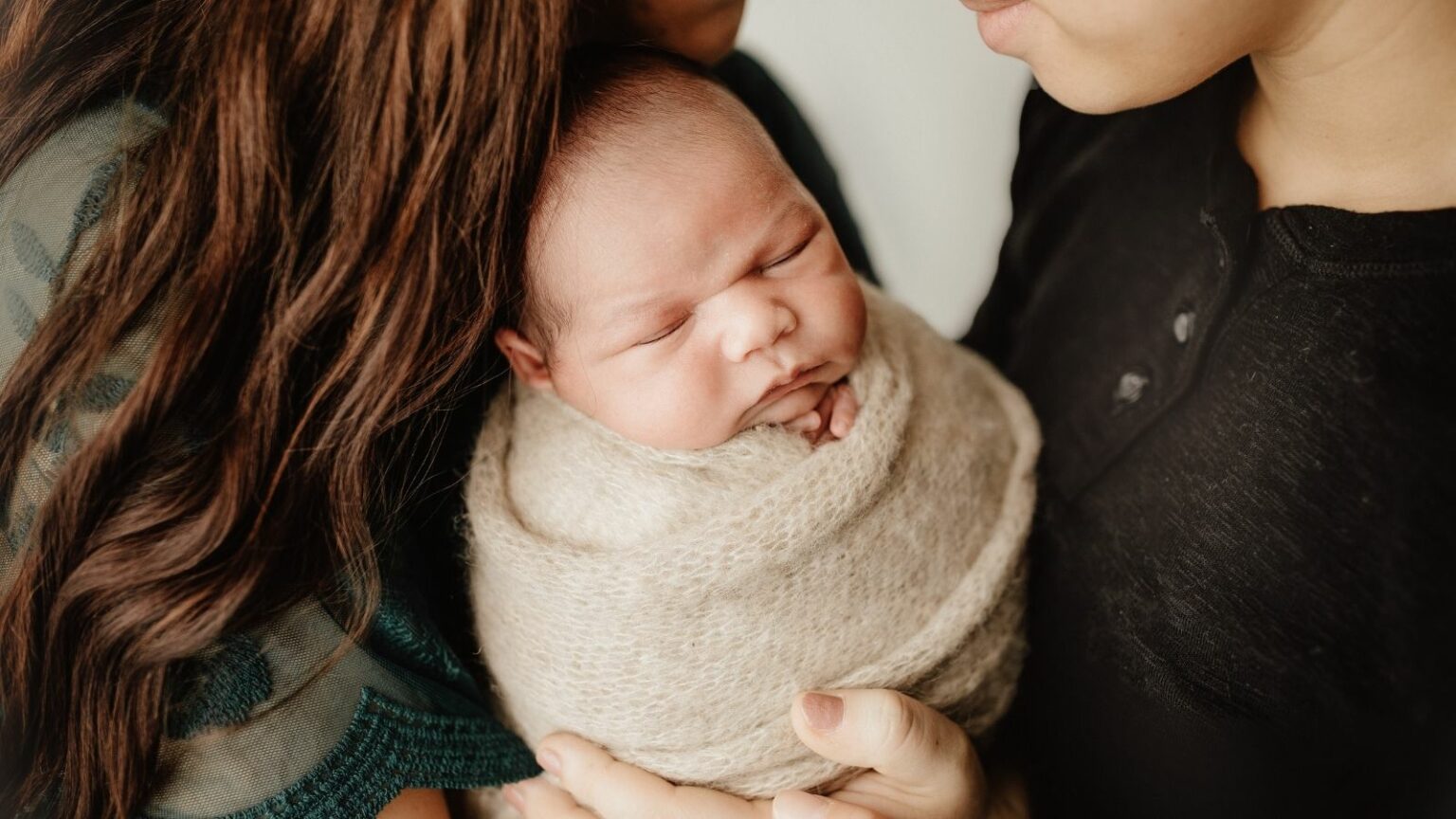
We meet Kalina and Jane, from Bulgaria and the UK respectively. Because their daughter Sara was born in Gibraltar, she cannot claim UK citizenship via Jane, so the couple applied to have her registered in Bulgaria. The Bulgarian authorities refused, therefore leaving Baby Sara stateless.
Kalina and Jane brought a case against the Bulgarian authorities to the EU Court of Justice, which was heard in March 2021. They join us to talk about their current situation, the case, and what it means to their family. We’re also joined by Arpi Avetisyan, Head of Litigation at ILGA-Europe, to talk about the wider implications of the case.
Rainbow Family Rights in Europe – Part 6: The Future

ILGA-Europe’s advocacy director, Katrin Hugendubel and Björn Sieverding from the Network of European LGBTIQ Families explore the issues coming down the line in terms of rainbow family rights, including direct child-parent recognition from birth, equal opportunities for children to find new parents by adoption or foster care, access to ART (including funding), and multi-parenting possibilities.
Rainbow Family Rights in Europe – Part 5: The Rights of Trans Parents and their Children
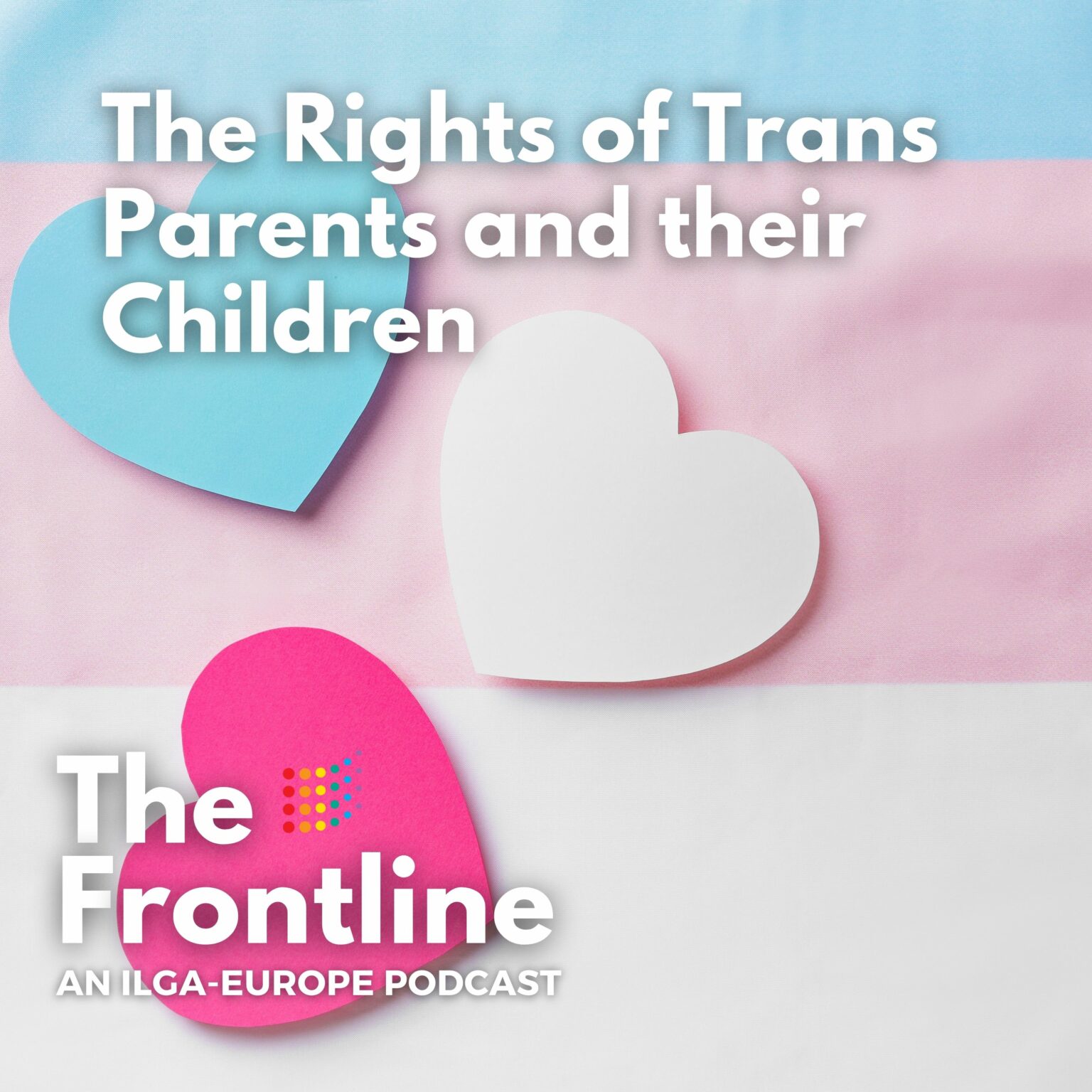
In March 2021, Transgender Europe (TGEU) published the report, “Stuck on the swing: experiences of trans parents with freedom of movement in the EU”, in which 18 trans parents from across Europe shared their stories and thoughts. The report found that trans parents and their families face serious barriers when it comes to moving safely and freely across the European Union.
In the fifth part of our mini-series on rainbow family rights, during which we we’re looking at the issues affecting LGBTI partners, parents and their children across Europe, we talk to Senior Policy Officer with TGEU, Richard Köhler, and Slovenian trans-activist, Lea Aymard, one of the parents featured in the report, about the current state of play and ways forward.
Rainbow Family Rights in Europe – Part 3: The Western Balkans

We are joined by Danijel Kalezi?, president of the Governing Board of Queer Montenegro, which helped usher in legislation for civil unions for same-sex couples, which were signed into law last year, making Montenegro the second Western Balkans country, after Croatia, to do so.
Danijel is with us to talk about the journey so far in Montenegro, and the state of play for same-sex partnership rights across the Western Balkans.
The Frontline: LGBTI communities in Europe: Pushed to the brink
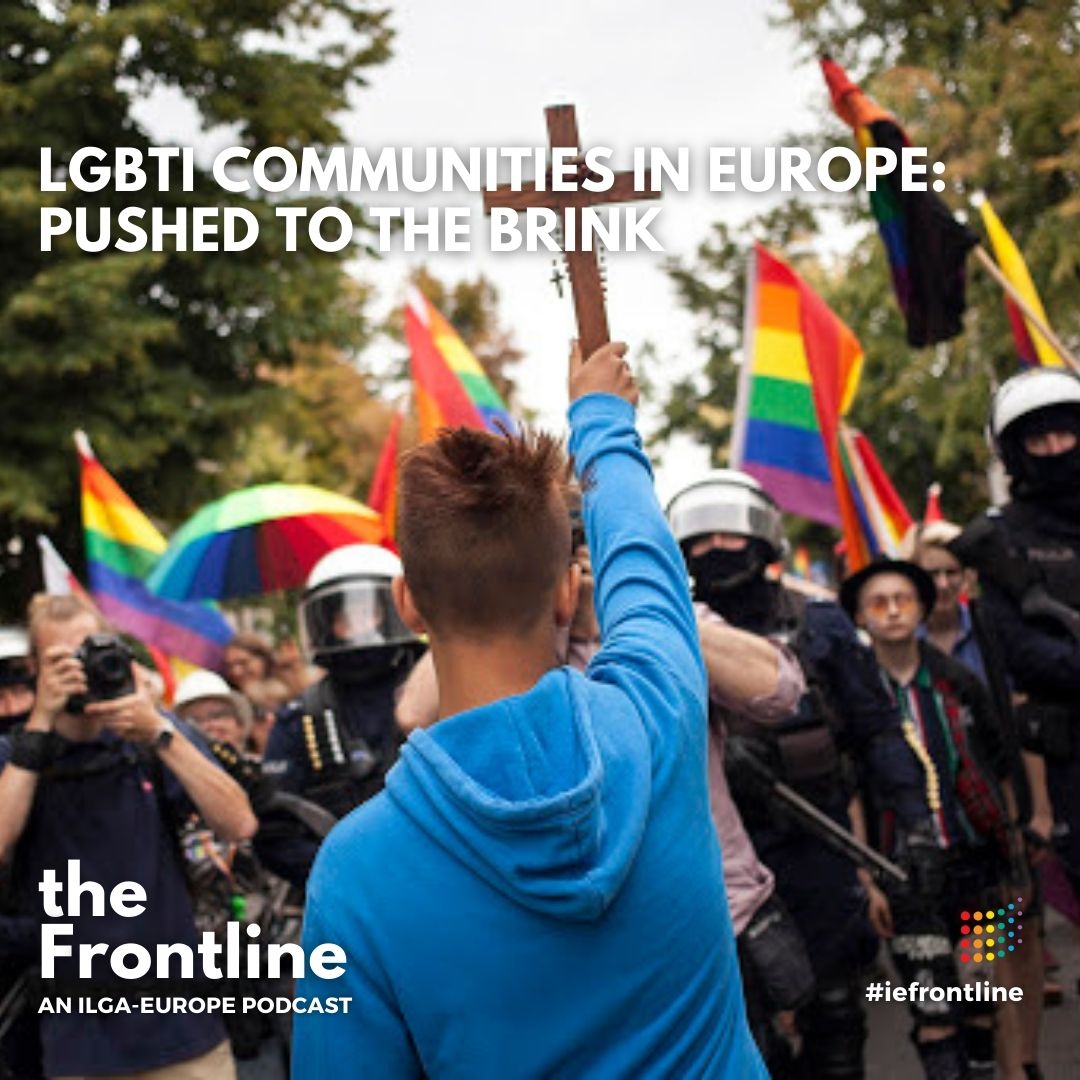
Reporting from country after country provides a glaring clarification that progress which has been taken for granted is not only increasingly fragile, but particularly vulnerable to exploitation by anti-human rights forces.
In this episode of The Frontline, we get an overview of the stark situation from ILGA-Europe’s Advocacy Director, Katrin Hugendubel. Executive Director of Transgender Europe (TGEU) talks to us about the significant growth of opposition towards trans rights across Europe; and Executive Director of ILGA-Portugal, and Marta Ramos tells us about the rise of the anti-gender movement in her country, and the ways in which LGBTI organisations have had to skew their work during the COVID-19 pandemic towards provision of basic necessities like food and shelter as many governments left LGBTI people out of their relief packages.
Listen below or click here to listen and subscribe to The Frontline on your favourite podcast platform.
The Frontline: 2020 – The EU & LGBTI Equality in an Extraordinary Year
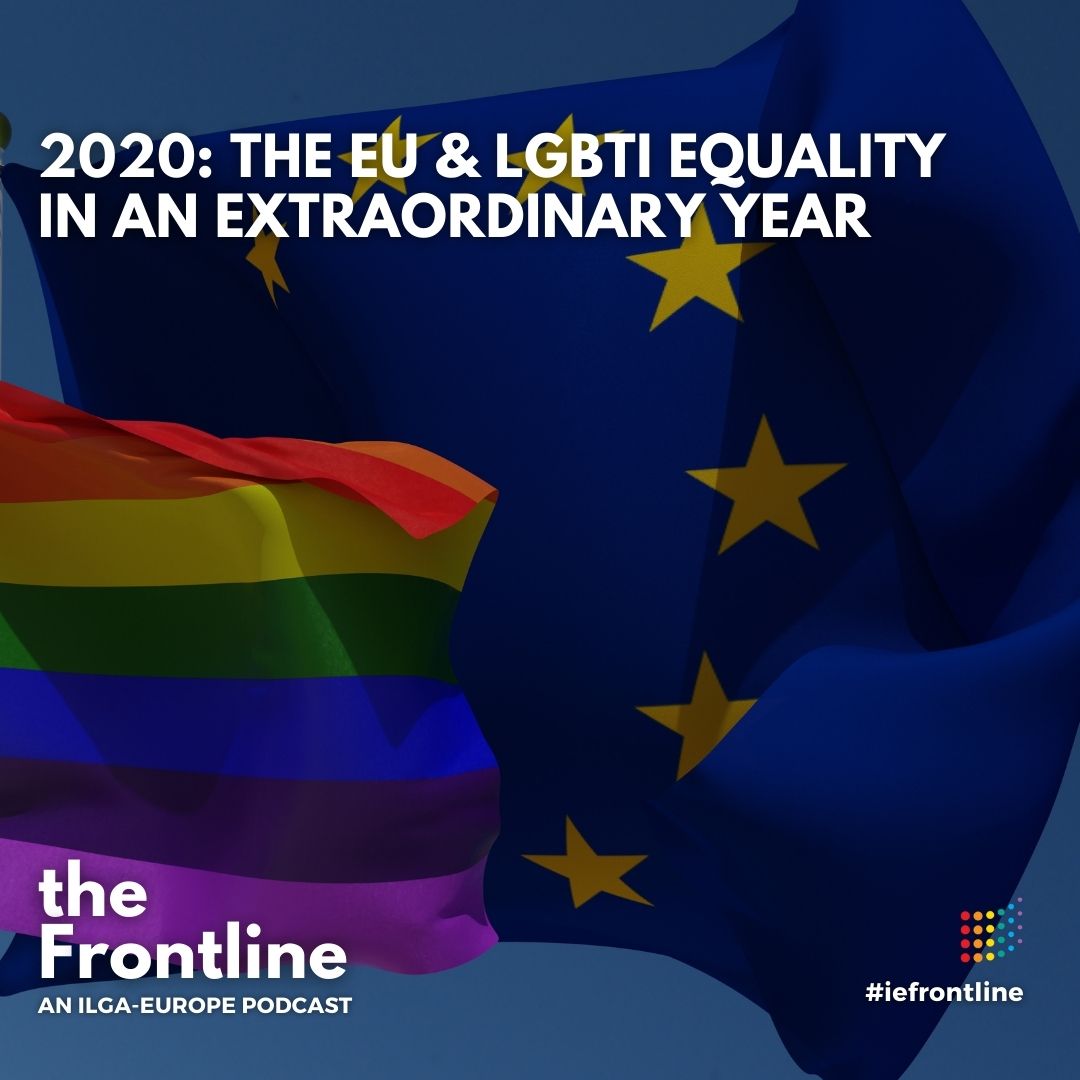
In March 2020, when the COVID-19 pandemic went global, we worried that equality would slip off EU agendas as lockdowns and an unprecedented economic crisis took hold. In this episode of The Frontline, we look back at the extraordinary year that was 2020, and the engagement of the EU in LGBTI equality issues, exacerbated during the coronavirus crisis.
Our Executive and Advocacy Directors, Evelyne Paradis and Katrin Hugendubel look back on what surprisingly turned out to be a successful year for EU engagement. Activists from ILGA-Europe member organisations in Slovenia and Hungary talk about the rise of ultra-right populism in both EU countries, Hungary’s slew of anti-LGBTI laws as the virus raged on, and their respective responses to EU institutional engagement and how it can go forward.
Members of the EU Parliament’s LGBT Intergroup, MEP’s Terry Reintke (Greens/EFA, Germany) and Maria Walsh (EPP, Ireland) give an inside view on the year gone by, and reflect on a challenging first year for the new Intergroup. It all adds up to a comprehensive look at the EU and its engagement in equality, in a Europe where LGBTI rights have become a sharp dividing line.
Listen below or click here to listen and subscribe to The Frontline on your favourite podcast platform.
The Frontline: Countering the Rise of State LGBT-phobia in Poland
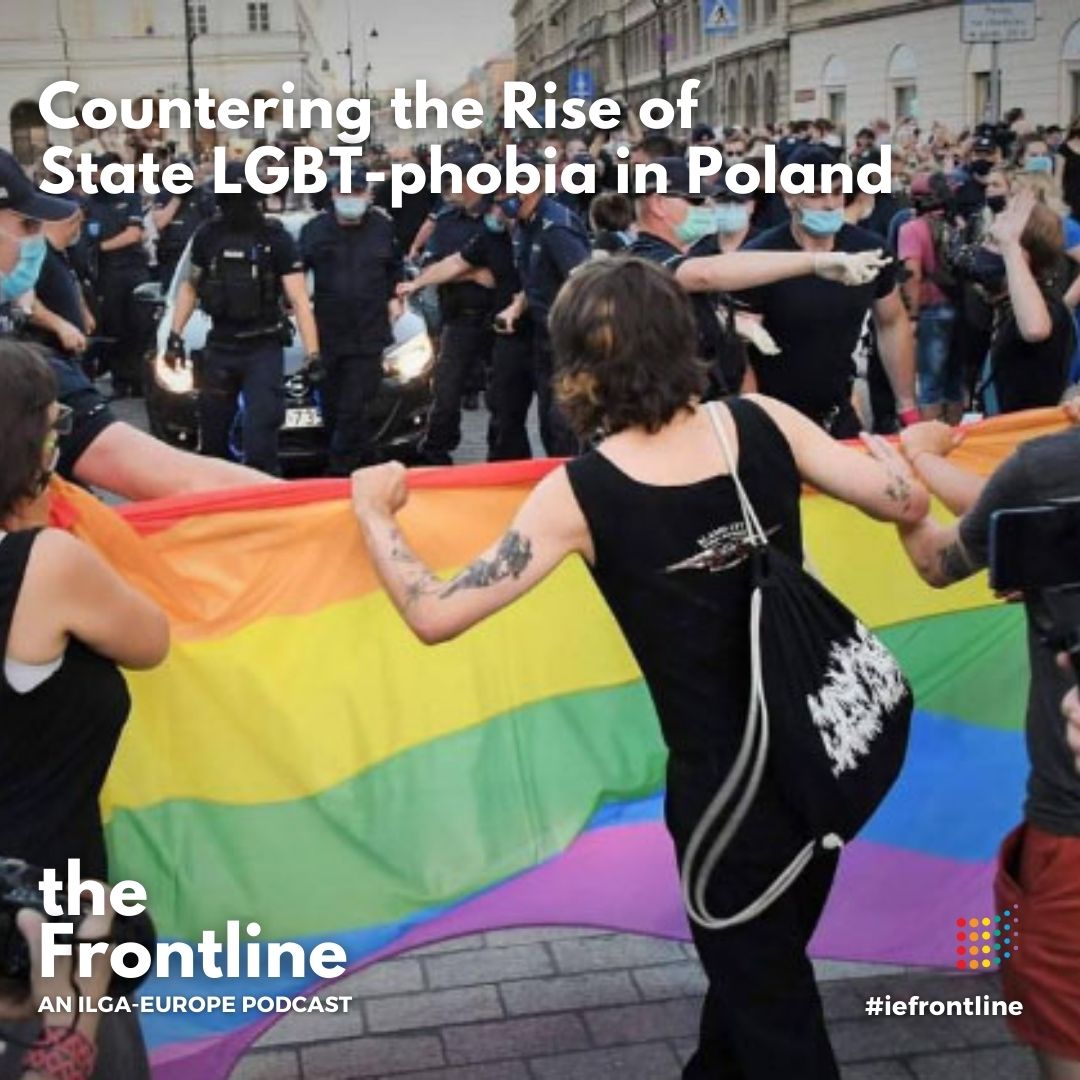
We talk to Polish activist Slava Melnyk from KPH (Campaign Against Homophobia) about how the situation has come to a head in the aftermath of the re-election of far-right President, Andrzej Duda.
David Socha, a young gay man living in the city of Pulawy, which has been designated one of Poland’s LGBT-free Zones, tells us about how this has affected his day-to-day life, and the ILGA-Europe advocacy team discuss the role of the EU institutions and external actors, and ways forward for the LGBTI movement in Poland.
Listen below or click here to listen and subscribe to The Frontline on your favourite podcast platform.
The Frontline: Bulgaria and the Spread of European Anti-LGBTI Populism
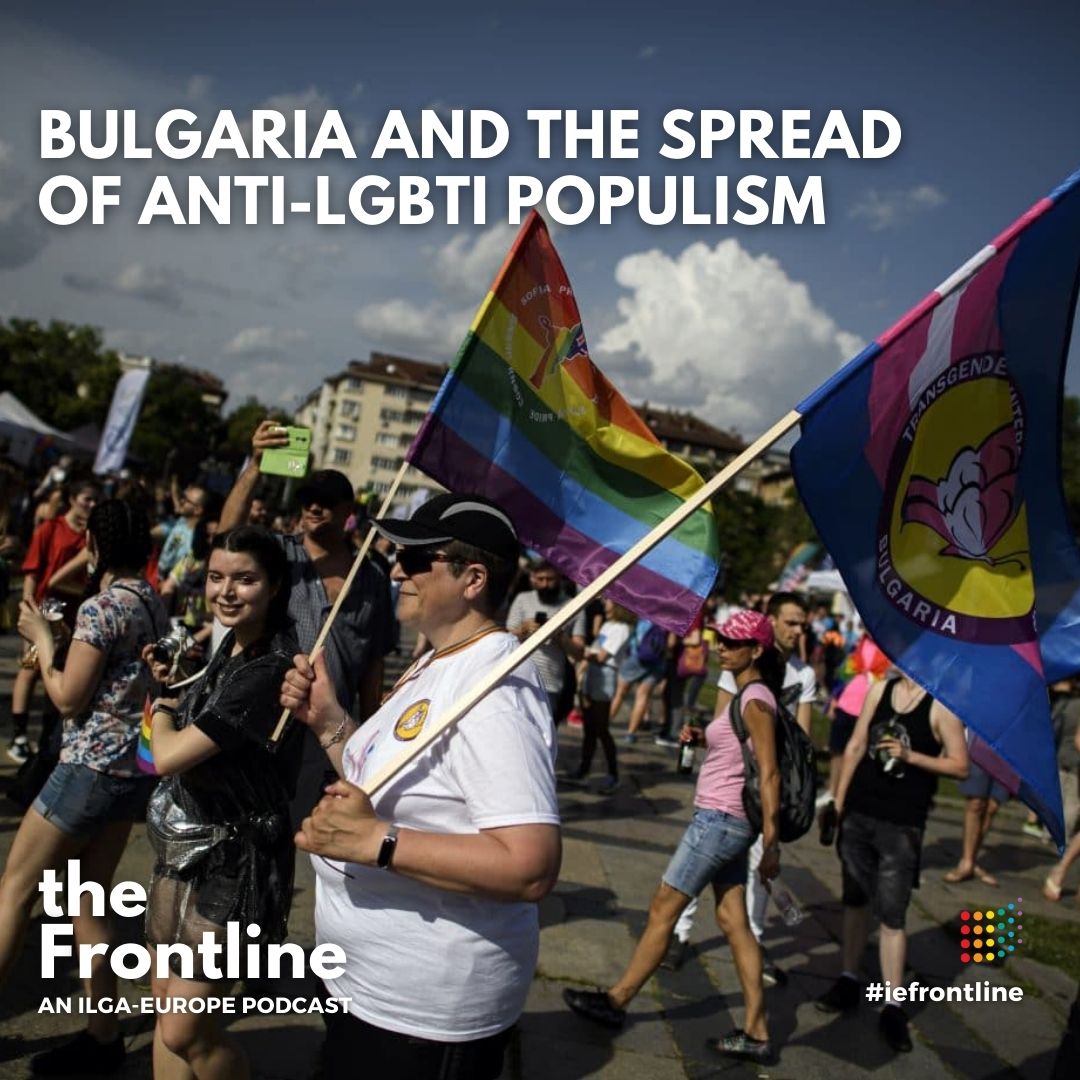
“Attitudes towards LGBTI people are changing and changing fast,” says activist, Lilly Dragoeva from the Sofia-based Billitis Foundation, in this episode of The Frontline, which delves into the current situation in Bulgaria, a country we don’t often hear about as Poland and Hungary’s governmental persecution of LGBTI people grabs the headlines. There may not be LGBT-free zones in Bulgaria, but it’s a country with almost no protections for LGBTI people, a growing, so-called ‘anti-gender’ movement, a successful spreading of demonising fake news stories, and an alarming advance in societal rejection of LGBTI people.
Along with Lilly, we speak with activist Simeon Vasilev from GLAS Foundation about a growth in official anti-LGBTI hate speech and the role the EU can play, and with Dimithar Dimitrov from the Bulgarian city of Plovidiv, where in September there were organised attacks on young people who are perceived as LGBTI.
Some hope for Bulgarian LGBTI people comes in the form of strategic litigation for the recognition of a rainbow family, and we speak to attorney Denitsa Lyubenova, from the LGBTI youth organisation, Deystvie, about the current state of play with the case.
Rounding the episode up, ILGA-Europe’s Programmes Director, Bjorn Van Roozendaal talks to us about the wider picture in Europe, the reasons behind the growth we’re seeing in anti-LGBTI politics and movements, and the way the LGBTI movement can strategise to counteract this.
Listen below or click here to listen and subscribe to The Frontline on your favourite podcast platform.